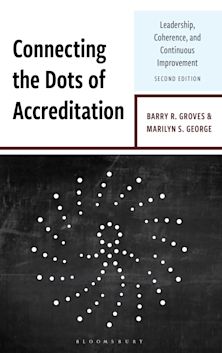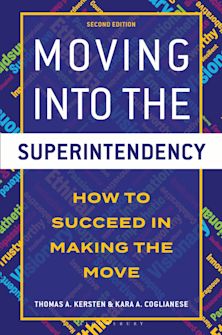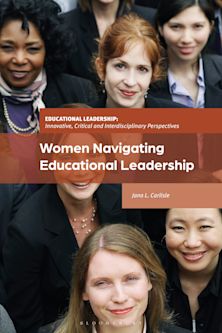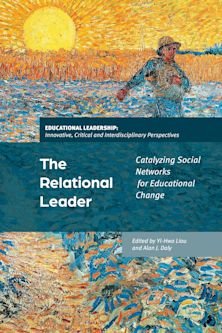Women Leading Education across the Continents
Overcoming the Barriers
Women Leading Education across the Continents
Overcoming the Barriers
This product is usually dispatched within 1 week
- Delivery and returns info
-
Free CA delivery on orders $40 or over
Description
Women Leading Education Across the Continents—Overcoming the Barriers is the third collection of research about and stories of women leading education on every continent in the world. Internationally recognized scholars and practitioners offer a research-based conversation and systematic collaborative inquiry in exploring the status of women in educational leadership. Their work invites global policy development highlighting women's educational leadership as a critical social justice issue. The array of topics this volume includes are gender status and educational leadership, challenges and barriers for women leaders, confronting the barriers, leading in challenging contexts, and deconstructing the discourse on gendered leadership. This compelling book offers food for the intellect and rage for the belly that impels forward the moral imperative of women leading education internationally.
Table of Contents
Helen Sobehart, United States
Acknowledgments
Elizabeth C. Reilly and Quirin J. Bauer
Prologue: I'm Not Going to Take This Sitting Down: The Use and Misuse of Feminist Standpoint Theory in Women's Educational Leadership Research
Charol Shakeshaft, United States
Section 1: Gender Status and Educational Leadership
Section 1 Editor - Rachel McNae
Section I Overview: Gender Status and Educational LeadershipJacqueline Oram-Sterling
The American School Superintendent: Women and the SuperintendencyNoelle M. Ellerson, United States
The Gender Gap in Academia: The Case of CyprusMaria Eliophotou Menon, Deana Charalambidou-Solomi, and Mary Koutselini, Cyprus
‘Breadwinners’ and ‘Homemakers’: How Constructions of Masculinities affect Women’s Progression in LeadershipPontso Moorosi, United Kingdom
An Investigation of Gender Differences in Teachers’ CommunicationsApostolia Beka, Greece
Where are All the Women Superintendents?: A Case Study of Pennsylvania, USA, Jill Sperandio, USASection 2:Challenges and Barriers for Women Leaders
Section 2 Editor
Anjale Welton
Section 2 Overview: The equal opportunity policy functions – with which strategies, under which circumstances and in which period of time? Susanne Gruber
Leadership Perspectives from a New Generation of Women Leaders: Balancing Acts ContinueWhitney Sherman Newcomb and Margaret Grogan, United States
Why Do Women Leave the Superintendency?Kerry Robinson, United States
Transforming the Field? Scholarship of Women in Educational Administration Rhonda Mcclellan, Dana Christman, and Adrienne E. Hyle, United StatesBarriers to Leadership and Challenges faced by female Heads in Educational Institutions in UgandaAlice Kagoda, Uganda
What Kind of Times Are These?: The Mystery of Sexual Harassment in the Post-Liberal Feminism EraCatherine Marshall, Brooke Midkiff, Stephanie Galloway, and Keren Dalyot, United States
Section 3:Confronting the Barriers
Section 3 Editor
Kerry Robinson
Section 3 Overview: Confronting the Barriers of Women Leaders around the WorldEsther Sui-Chu Ho, ChinaEmpowering Female Faculty in Ghana’s Public Universities: Mentoring - a Door Opener in the University of Education, Winneba and University of Cape Coast, GhanaJoyce Wilson-Tagoe, GhanaOrganizational Development by Fostering Young Academic Talents with Gender MainstreamingQuirin J. Bauer, GermanyFemale Graduate Students (Re)Define Mentoring in Educational Leadership: Results from a SurveyAnjalé Welton, Katherine Cumings Mansfield, and Pei-Ling Lee, United StatesTalking About Intersections of Gender, Race, and Class During Training of Public Teachers in São Paulo, BrazilRosangela Malachias, Brazil Section 4:Leading in Challenging Contexts
Section 4 Editor
Diane Reed
Section 4 Overview: Leading in Challenging ContextsLinda Lambert
Women of K-12 and Higher Educational Leadership in Afghanistan: A Comparison of ProgressElizabeth C. Reilly, United States
The Role of Women Leaders in a World of Terrorism and Natural DisastersAbida Mahmood, Pakistan
Women Leading Schools in Challenging ContextsJane Rarieya, Tanzania
One sister’s story of school leadership in the PhilippinesMichelle Colay, Philippines
Section 5: Deconstructing the Discourse on Gendered Leadership
Section 5 Editor
Katherine Cumings Mansfield
Section 5 Overview: Deconstructing the Discourse on Gendered LeadershipJane Rarieya
Theorizing Women Leaders’ Experience: Caught in the WebJacky Lumby, United Kingdom
Where Does the Power Lie? Gender, Leadership, and Positional PowerSaeeda Shah, United Kingdom
Applying the Leader Resilience Profile® to Compare and Contrast Leader Resilience by GenderDiane Reed, Bruce Blaine, Jerry L. Patterson, United States
Learning Gendered Leadership: A Discursive StruggleKay Fuller, United Kingdom
Epilogue
Elizabeth C. Reilly & Quirin J. Bauer
About the Editors
About the Section Editors
About the Contributors
Index
Product details
| Published | Apr 08 2015 |
|---|---|
| Format | Hardback |
| Edition | 1st |
| Extent | 226 |
| ISBN | 9781475802245 |
| Imprint | Rowman & Littlefield Publishers |
| Dimensions | 288 x 225 mm |
| Publisher | Bloomsbury Publishing |



































